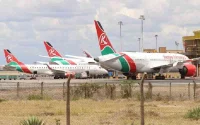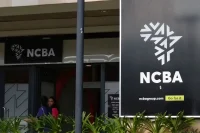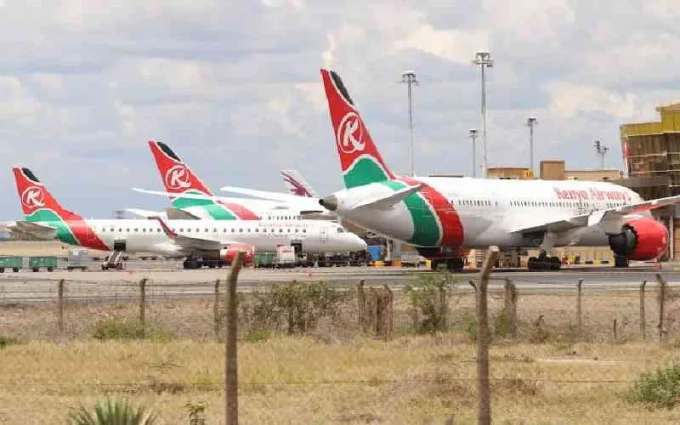NAIROBI, Wed Dec 14 (Daily Nation) – Five commercial banks were today accused of manipulating foreign exchange trading leading to the rapid slide of the Kenya shilling against the major currencies. Mr Shakeel Shabbir (Kisumu Town East) alleged that Barclays Bank of Kenya, Equity Bank, Standard Chartered Bank, Family Bank and the KCB Bank Group were behind the speculative acts in the money market, which led to the rapid dip in the value of the shilling in October this year.
The MP named the banks under parliamentary privilege during public hearings at the Nairobi’s County Hall. The hearings are conducted by an ad hoc select committee investigating the rapid decline in the value of the shilling. Senior managers from the Barclays, Cooperative, KCB, Equity, and Housing Finance attended the meeting. He said the banks had cornered the market, in their bid to make “super-normal profits” had gone to the Central Bank, borrowed lots of money and bought US dollars, thus putting pressure on the shilling.
Mr Shabbir said a form of insider-trading had taken place, and now the cartels in the banking industry had “made their money and disappeared leaving Kenyans with a lot of loans.” “You’re not the only ones, but you’re among them. You’ve been able to manipulate the Central Bank of Kenya, so, you’re now benefitting from the high interest rates while borrowers are suffering,” Mr Shabbir said.
The MP added that the CBK has had management issues, given that it has not had a deputy governor because the former one was ailing; at the time of the crisis, the Monetary Policy Committee, which is supposed to hold weekly meetings, had not met for over three weeks, and that the Central Bank has had no board for management. But the banks denied any wrong-doing saying that the regulator (CBK) had a very tight stranglehold on the industry.
The banks poked holes at what they called “weaknesses” in the market fundamentals that could be exploited, and may have been exploited by some players to make money through arbitrage—the practice of making money by exploiting price differences in the forex market. As the meeting concluded, Parliament’s select committee chair on the depreciation of shilling, Mr Adan Keynan termed the allegations of speculation and arbitrage as baseless, because the committee had “nothing concrete” to back the allegations.
He said there were a lot of rumours flying around, and unless there was sufficient evidence, the committee wasn’t going to get involved in rumour-mongering. “I ask the Hansard reporters that you should please expunge that issue on the five banks, so that we don’t have aspersions on key institutions that play a role in the country. Should there be any issue, we’ll recall you,” Mr Keynan told the banks.
Mr Adan Mohammed, the CEO of Barclays Bank; Mr Michael Wachira for Equity, and Mr Paul Tikani the Chief Operations Officer of KCB, all said that as a policy, they don’t deal in speculative behaviour, more so, if it is deliberately geared at sabotaging the value of the shilling. “As a bank, we do not take speculative positions on any foreign currency. Even if we took, it is being done within the rules that the regulator has set. We did not participate in any speculative activity,” said Mr Mohammed.
He said the Central Bank had inspected the books of the banks, and that the daily volumes in forex trading “have not changed”. “If we take such (speculative) positions, you’d see significant spikes and troughs. We’re confident, we’re not one of those (rogue banks)…” said Mr Mohammed. Mr Wachira said Equity’s target market was not that much into forex trading, and that the volumes of forex were not that significant as to influence the value of the shilling.
“We’re definitely not in the top five banks. In no way could we have been responsible for the depreciation of the shilling,” said Mr Wachira. Mr Tikani added: “KCB is not in any way involved in any kind of trade that will depreciation of the shilling.” The bankers said there’d be “pain in the short-term” as the Central Bank raised the interest rates to tame inflation and put brakes on the depreciation of the shilling.
The banks said the depreciation of the shilling and the resultant inflation was a culmination of many factors like food shortage, the Eurozone debt crisis, the talk of recession in the US market, the Arab uprisings and the high import bill in the country that’s almost double the export needs.
















































![Pula Co-Founders and Co-CEOs, Rose Goslinga & Thomas Njeru. Pula provides agricultural insurance and digital products to help smallholder farmers manage climate risks, improve farming practices and increase their incomes. [ Photo / Courtesy ]](https://businesstoday.co.ke/wp-content/uploads/2021/01/Pula-Co-Founders-and-Co-CEOs-Thomas-Njeru-Rose-Goslinga.jpg)



























































Leave a comment